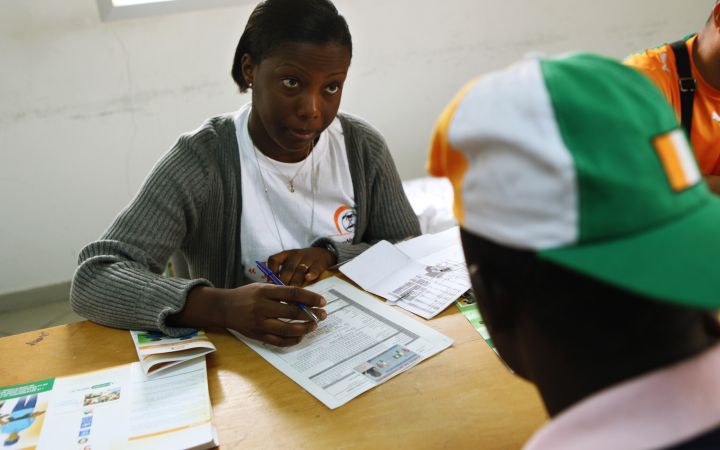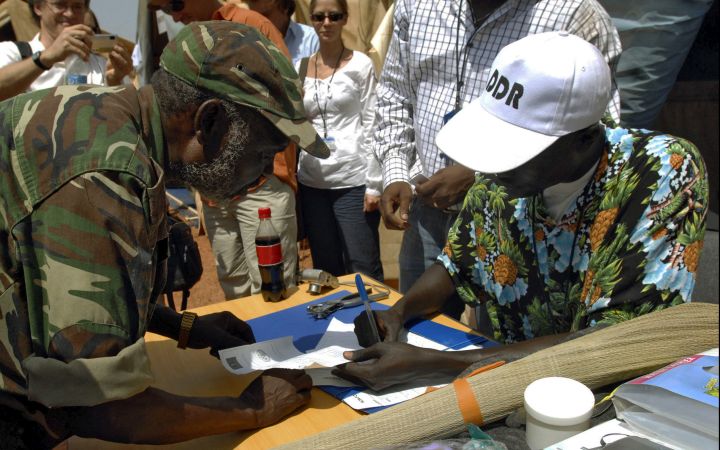Showcasing the World Bank UN OHCHR UNITAR and AU Joint Program
The pursuit of peaceful and just societies is a collective aspiration that requires collaborative efforts among global, regional, national, and local partners to succeed.
Africa is currently facing the largest spike in violent conflict and forced displacement in the past 50 years. In such a framework, the root causes for why people fight span a wide range of thematic areas. These range from socio-economic issues to security and civic political issues that are all increasingly being affected by climate change. Faced with these challenges there is a widespread consensus among global, regional and national partners that they need to work more effectively together, to address collectively identify solutions across organizational silos.
Moved by the call that there is a concrete need for concerted action, UNITAR has been a key partner in an innovative initiative that aims to strengthen conflict prevention and response mechanisms across the African continent: the Joint AU WBG UN program Strengthening Operational Linkages between Early Warning and Conflict funded by the UK FCDO.
This unique joint program focuses on two specific objectives:
- Build capacity and enhance operational linkages between African Union (AU) conflict prevention and conflict response instruments and those being used at regional and national levels to address the root causes of conflict, using early warning (EW) and DDR sectors as entry points.
- Strengthen the analysis and decision-making linkages between EW systems and decision-makers to support earlier, more preventative responses, instead of just prior to, or at the imminent onset of, conflict.
In the framework of this initiative, UNITAR's collaboration with African Centres of Excellences (CoEs) has been instrumental in adapting and delivering the blended training program designed by UNITAR on the AU Operational Guidance Note on Disarmament, Demobilisation and Reintegration (AU OGNs on DDR) – which includes an online self-paced course, a Training of Trainers, and face-to-face training. Moreover, UNITAR’s strategy to work with COEs through a cascade training approach provides a valid means to create a sustainable impact beyond the program’s lifetime as it enables capacity-building opportunities to continue through a multiplier effect across the continent. Finally, by having training institutions come together and exchange ideas, experiences, and best practices, the joint program has leveraged existing capacities.
While in 2020 and 2021, UNITAR contributed to the broader dissemination and operationalization of the AU OGNs on DDR, in 2022 its work has focused on linking DDR with essential thematic areas, such as Weapons and Ammunition Management and Countering Violent Extremism. The adaptability and customization of the blended training program ensured its relevance to the diverse issues and contexts prioritized by the AUC, reinforcing the capacity of the AU in conflict prevention and response.
The ongoing phase of the initiative, starting in 2023, places a strategic emphasis on supporting the uptake of early warning and action pathways into the AU giving a key role to human rights. This forward-looking approach aims to enhance conflict prevention and response outcomes at different levels across Africa – from central AU actors to National Human Rights Institutions and local civil society organizations. Integrating the human rights angle into early warning mechanisms across AU's operational frameworks and down to Regional Mechanisms and Regional Economic Communities signifies an evolution in approach, emphasizing the importance of proactive measures in identifying and addressing potential conflicts before they escalate.
The key to building resilient and peaceful societies lies in the seamless integration of conflict prevention and response strategies. UNITAR's support in linking early warning systems with response strategies, which in the previous phases was specifically DDR, underscores the importance of a holistic approach. By supporting the efforts of different stakeholders in addressing the root causes of conflict through a transversal human rights approach that allows to enhance the interrelation between prevention and response, the initiative seeks to break the cycle of violence and instability.
The Joint AU-WBG-UN programme - of which UNITAR is the capacity-building partner - represents a significant step towards building stronger and conflict-resilient nations in Africa.
Going forward the emphasis will be on translating the lessons learned to serve as a blueprint for similar efforts worldwide, demonstrating the transformative power of collective action in fostering lasting peace and justice.



